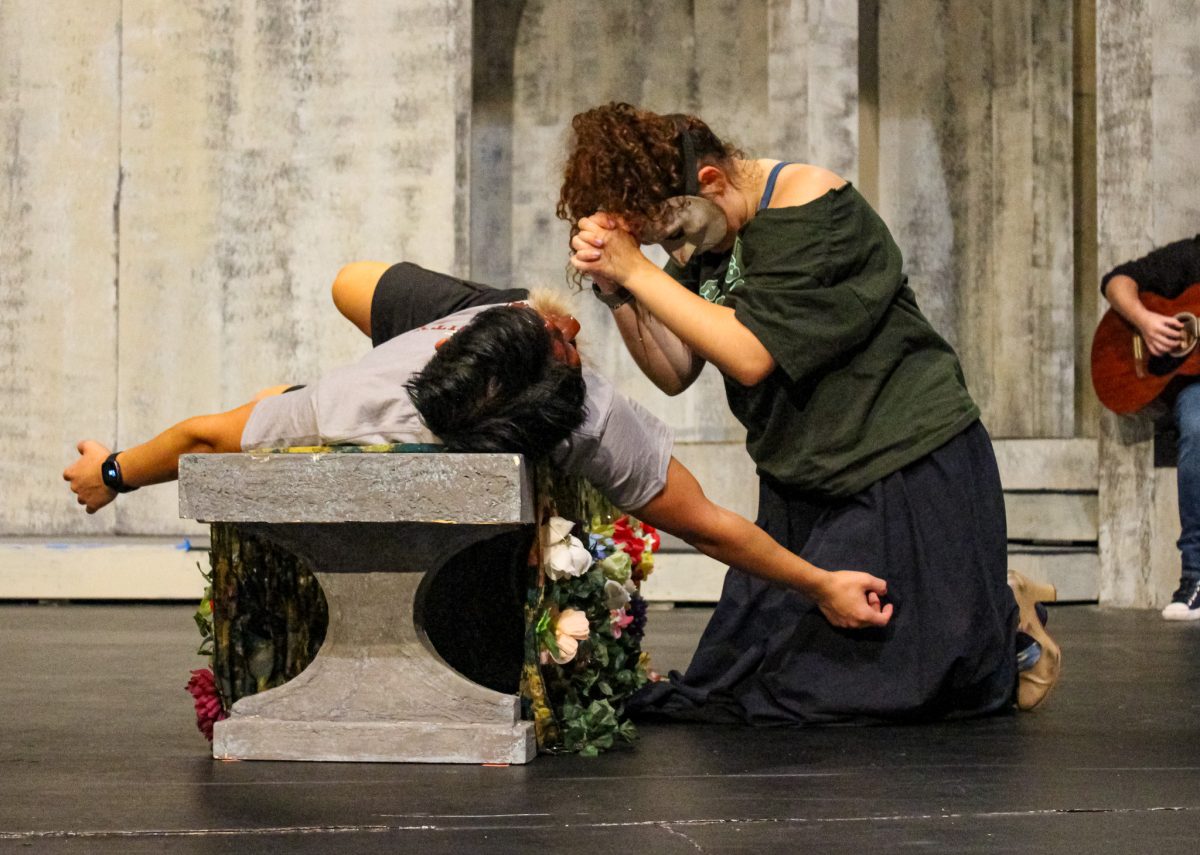Trinity University’s theater department debuts its rendition of Hamlet in the Stieren Theater on Nov. 8. The play, directed by Stacey Connelly, associate professor of theater at Trinity, lasts around three hours and presents a faithful rendition of the celebrated Shakespearean play.
‘Hamlet’ runs from Nov. 8 through Nov. 16, excluding Nov. 11 and 12, with performances beginning at 7 p.m. For the early crowd, there will be one Sunday matinee showing on Nov. 10 at 2:30 p.m. Tickets are free and available to the public on the Brown Paper Tickets website, though reserving a ticket ahead of time is not required. Seating is general, so those who prefer a specific seat are recommended to arrive early.
‘Hamlet’ is a tragedy that follows the story of Prince Hamlet of Denmark as he struggles to seek revenge for his father’s death. The play presents universal themes of justice, mental health and political plays for power. According to Connelly, these universal themes are what makes ‘Hamlet’ so special.
“‘Hamlet’ is probably the most famous play in the English language. It is certainly Shakespeare’s most profound play. It is also his longest play, and it features the longest leading role in the Western canon,” Connelly said. “It maintains a special place, not only in school curricula but … by all levels of theater.”
Notably, Connelly has made the decision to preserve as much of Shakespeare’s original vision as possible. The majority of the text was kept intact and no significant characters were cut. Thus, the relatively small cast of 29 students have been responsible for memorizing an abundance of lines and some have been required to double, triple or even quadruple roles.
“We’ve tried to keep the story intact because I think Shakespeare put all of those characters in there for a reason,” Connelly said.
However, audiences may notice one pivotal difference between the original Hamlet and this production — the decision to cross-gender the leading role, Prince Hamlet himself. Connelly casted Anna Kate Vaughan, junior marketing major, for the role of Hamlet. However, she noted that her portrayal of Hamlet has very little to do with gender. Instead, she plans to embody Hamlet by highlighting the human experience of grief, madness and revenge.
“It’s not really about gender. They’re not making me use a deeper voice, I’m not cutting my hair. I just have a long braid down my back,” Vaughan said. “[Connelly] said that she was more interested in Hamlet as a person and how he is that way than anything.”
Eleanor Distel, first-year anthropology and art history double-major, is playing Ophelia — the daughter of Polonius, sister of Laertes and romantic interest of Hamlet. She said that despite the initial struggle to find the balance between the emotionally taxing long rehearsal times and her other commitments, she has come to enjoy rehearsals. She emphasized the emotional connections she has formed with her castmates.
“It’s a fun, community-building experience,” Distel said. “I mean, I didn’t know anybody in the show when it started. Now, I feel very close to a ton of people. I formed connections and made friends, and I think you can see that on stage.”
Additionally, the cast has had to reckon with the long-standing legacy of ‘Hamlet.’ Liam Brinks, senior theater major, plays the principal antagonist, King Claudius. He said that portraying such an iconic character is both an honor and a nerve-wracking experience.
“There’s a little bit of a pressure. It’s like, ‘Oh, this character. How am I gonna make it my own character?’ I’ve done a pretty good job of not seeing a lot of other medias and trying not to take as much influence from other things and make it as much my own as I can,” Brinks said. “I mean, Shakespeare. It’s like the thing that everyone hears about it at some point in their life.”
Ultimately, the play promises an action-packed night featuring sword fights, elaborate costumes and lots of death. After countless hours of rehearsals, it is time for ‘Hamlet’ to make its debut — an opportunity that both Shakespeare aficionados and novices are encouraged to take advantage of.
“Come see the amazing work of these students. It’s amazing to me that the people putting on the show are between the ages of 18 and 22 years old,” Connelly said. “I just feel like every college student should have the opportunity to speak Shakespeare’s verse because it really is a life-changing thing.”









